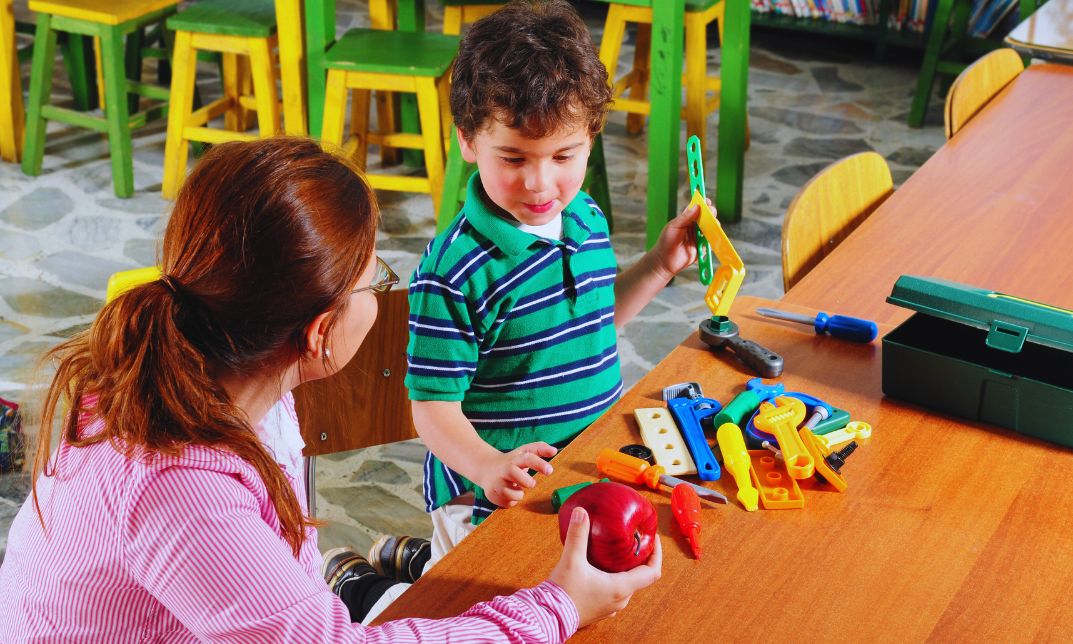What skills do you gain from being a teaching assistant? Imagine a job where you help teachers and students every day. That’s what a teaching assistant (or TA) does. But guess what? It’s not just any old job. It’s like signing up for a super fun training camp. Here, you learn awesome skills! These skills help you in school and even help at home, too. Also, they prepare you for big jobs when you grow up. Being a TA is like collecting superpowers. These superpowers make you better at life.
Let’s jump in and explore!
What Skills Do You Gain from Being a Teaching Assistant?
First, let me quickly peek at the cool stuff you’ll learn as a TA. We’ll cover communications, teamwork, behaviour management, empathy, organisation, problem-solving, confidence, and career-boosting skills. Each of these is like a shiny new tool in your toolbox. They build on each other. So, let’s start with the first one!
Top Communication Skills You Gain as a TA
As a TA, you speak with pupils of different ages every day. One minute, you may be helping a kindergartener sound out simple words; the next, you’re chatting with a fifth grader and explaining complex ideas. You adjust your language to make it simple for young children and clear for older students.
You listen well, too. A kid might whisper something important, so you pay attention. You explain tasks simply: “First, draw a circle. Then add eyes.” This helps kids understand quickly. Also, connect with teachers and parents. You tell the teacher, “This student needs help.” Or inform a parent, “Your child read a whole book today!”
The National Careers Service says this builds strong speaking skills. Indeed agrees. It happens twice in their tips, and another Indeed note says the same. It’s hard sometimes. Kids talk a lot! But when a kid says, “I get it!” you feel happy. You know you did great. This leads right into teamwork. Because good talking helps everyone work together.
How Being a TA Builds Teamwork and Collaboration
Next, you work alongside teachers, help other support staff, and team up with pupils. This cultivates cooperation. Everyone shares ideas. You give mutual support. A teacher might say, “Can you help with this?” You say, “Yes!” You share problem-solving. For example, “How do we set up this game quickly?” Everyone thinks together.
The experimentalist says this daily work makes you a team pro. It feels fun, like playing on a soccer team. You cheer each other on. You win together. This teamwork helps with the next skill. It keeps the class running smoothly.
Classroom Management and Behaviour Support Skills
Now, you learn to support routines. You say, “Time to clean up!” Kids follow. You manage transitions. “Let’s switch from reading to art.” This keeps things calm.
You encourage on-task behaviour. “Great job staying focused!” You assist with one-to-one help or small-group supervision. One kid might need extra reading, or a group might play a math game.
These steps are essential for smooth learning; scholars say so! It’s tricky some days—kids wiggle around! But when the class flows nicely, you feel proud—like you built a happy room. This calm leads to patience. Let’s see how.
Patience, Empathy, and Emotional Intelligence in Action
Working as a teaching assistant (TA) teaches you how to manage emotions, both your own and the children’s. Let’s explore it further!
Staying Calm When Things Get Crazy
Imagine a kid bursts into tears because they lost a coloured pencil. The whole class stares. And your heart races. But you? You take one big, slow breath. You stay cool. Every day, little storms pop up. A box of juice was spilt. A shoe has gone missing. Also, the “I can’t do this” breakdown! You practise maintaining patience under pressure as a TA with a smile. You spoke gently. Remaining calm will soon become your superpower. Don’t shout. Don’t panic. Just in peace!
Figuring Out What Kids Really Need
Next, you become a feeling detective. A quiet girl hides under her desk. Is she sad? Tired? Scared of the loud boy next to her? You ask gentle questions. “Are you okay?” Then watch her face. Her eyes, her hands. You understand the pupil’s needs fast. Then you help. Maybe a hug. A quiet corner with a book. You adapt support on the spot. “Let’s take a break.” Or “Try this way—it’s easier.” Kids feel seen and feel safe.
Growing a Super Kind Heart
Emotional intelligence becomes your most valuable asset as a result of all this work. Big words with a simple meaning: you experience other people’s emotions. When a boy frowns, you may tell he’s anxious about an exam. You can tell a female is frightened when she screams too loudly. Because you understand, you can assist more effectively. Your heart becomes kind. You cheer louder for youngsters who are nervous. Extra stickers are given to those who work very hard. This is your strength, not just goodwill! Smiles arise from tears. Your “I can’t” turns into “I did it!”
How This Helps Busy School Days
You stay firm because of this big heart. A crazy morning? You maintain your patience. An unexpected fire drill? You use soothing expressions to help frightened children. Your generosity enables you to manage chaotic days. Happy kids listen better. Calm classes run smoothly. You end the day tired but proud. “I made a difference,” you think. And guess what? This quiet, kind energy? It’s perfect for the next skill: organisation. Let’s see how!
Organisation and Time Management: Staying on Top of School Life
The role is interesting because no two school days are the same. As a TA, you quickly learn how to stay organised and keep everything moving smoothly. You prepare materials and activities ahead of time, plan small-group sessions, and manage time between lessons and tasks. You also keep track of pupil progress and know exactly who needs help and when.
Over time, this turns you into someone who thinks ahead, stays calm under pressure, and handles busy environments like a pro. These habits make you reliable, efficient, and ready for fast-paced workplaces — inside or outside education.
Therefore, smooth, structured, and always one step ahead — that’s the quiet power you gain in the classroom. Let’s talk about that.
Problem-Solving and Adaptability in the Classroom
Have you ever noticed that classrooms are full of surprises? As a TA, you have to be ready for anything! The classroom environment can change fast. The computer may stop working, or a student may need something different from your plan.
As a result, TAs become fast problem-solvers! They quickly adapt to last-minute changes, find creative ways to fix broken things, or figure out the best way to help a student who is having a tough moment. This ability to think on your feet and be flexible (or adaptable) proves you can handle any situation! This smart fixing makes you brave. See how next.
Confidence and Leadership from Supporting Lessons
Working with groups builds confidence. Under a teacher’s guidance, you lead parts of learning. During activities, you might read a story or show a craft. Gradually, you take on more responsibility—first small tasks, then bigger ones. As you grow, your voice becomes stronger, and you begin to feel truly confident.
Like a leader on a team, this bravery boosts your future. Let’s see why.
How TA Experience Improves Your Career Prospects
TA experience counts a lot. Thanks to the transferable skills you learnt. You prove you can handle real work. Also, some educators opine that these skills work everywhere! The amazing skills you learn in school don’t just stay in the classroom! In fact, TA experience is super valuable in many different careers. Why? Because you learn how to manage people and handle paperwork! If you decide not to be a teacher, your experience still looks fantastic on a resume for jobs in:
- Caring: Because you are patient and empathetic.
- Training and Coaching: Because you know how to teach things clearly.
- Office Work/Admin: Because you are organised and manage time well.
Transferable Skills: Why Employers Value TA Experience
Let’s quickly review your new superpowers! When you put “Teaching Assistant” on your job application, employers see that you have transferable skills. These are skills you can take with you to any job.
- Great Communicator: You can talk well to anyone.
- Strong Team Player: You know how to work together.
- Organised and Prepared: You can handle many tasks at once.
- Quick Thinker: You can solve problems and adapt easily.
- Empathetic: You understand people’s needs and feelings.
These skills are exactly what they look for in jobs like customer service, project management, and working in a Human Resources (HR) office!
Want to be an even cooler helper? Check out this awesome guide. It’s to become a Higher Level Teaching Assistant!
Final Thoughts: How Being a TA Helps You Grow Personally and Professionally
In conclusion, if you’re considering a career as a teaching assistant, remember that it’s much more than “simply a support job”. It is a powerful way to become skilled, empathetic, and confident. Besides, every day you spend in the classroom is an investment in your future! At the end of the day, you are building skills that will help you succeed no matter where you go!
Want to fast-track your HLTA journey? Train online and boost your career prospects with our recognised HLTA Course. Your skills matter, and this path helps you use them to make an even bigger difference.
FAQs: Skills You Gain as a Teaching Assistant
1. What are the skills of a teaching assistant?
- Clear communication, patience, classroom support, behaviour management, and helping students understand tasks.
2. How do I list my TA experience on a resume?
- Include your job title, school name, dates, and bullet points showing tasks like supporting lessons, helping students, preparing materials, and working with teachers.
3. What are the benefits of having a teaching assistant?
- Students get more support, teachers have help with tasks, learning runs smoothly, and behaviour is easier to manage.
4. What are the strengths of a teaching assistant?
- Calm under pressure, caring attitude, good listening skills, teamwork, and strong organisation.
5. What skills does teaching give you?
- Leadership, planning, communication, problem-solving, and confidence in working with different people.
6. What are the qualities of a teacher assistant?
- Kindness, patience, respect, flexibility, and a positive attitude towards learning.
7. What are the 5 skills of a teacher?
- Communication, classroom management, planning, empathy, and subject knowledge.
8. How to stand out as a teaching assistant?
- Be reliable, show initiative, build strong relationships with students, stay patient, and support the teacher without being asked.
9. Why do you think you’d be a good TA?
- Because you care about students, you stay patient, you enjoy helping others learn, and you work well with teachers and children.
10. What are the most important skills of a learning support assistant?
- Supporting special needs, adapting tasks, patience, clear communication, and helping students build confidence.



